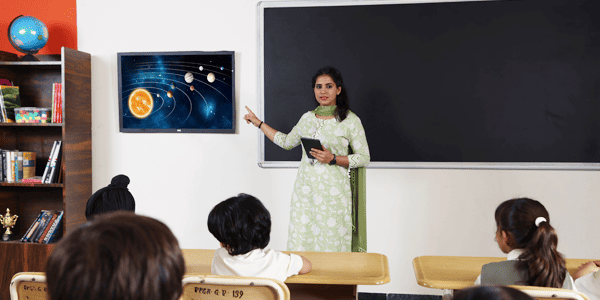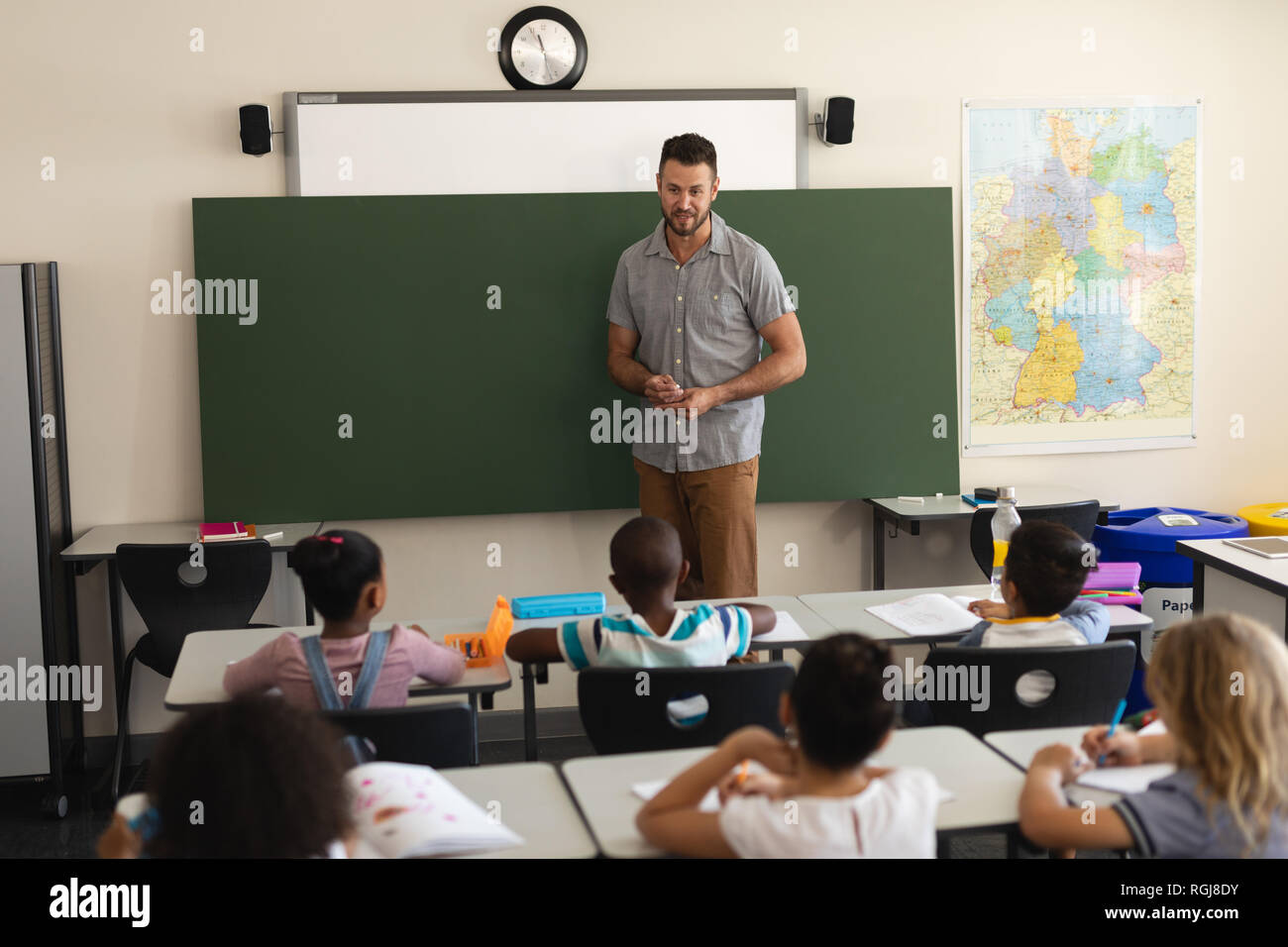Improve Your Child’s Performance with Primary Science Tuition Singapore
Improve Your Child’s Performance with Primary Science Tuition Singapore
Blog Article
Discover the Crucial Benefits of Comprehending Primary Scientific Research for Young Learners
The importance of main scientific research education and learning for young learners expands much beyond plain expertise purchase; it acts as an essential pillar in establishing necessary abilities such as critical reasoning, analytic, and creativity. Engaging with scientific concepts via inquiry-based and interactive activities not only grows inquisitiveness however additionally prepares for resistant, positive students. As we explore these benefits further, it ends up being clear that the ramifications for future academic and individual development are extensive. What specific approaches can instructors use to optimize these advantages?
Enhancing Essential Believing Skills
Cultivating crucial assuming abilities in young students is necessary for their cognitive development and future scholastic success. Vital reasoning enables children to examine details, assess evidence, and make notified choices, which are important abilities in today's information-rich culture. By participating in clinical questions, young learners can improve these skills as they discover concepts with observation, reasoning, and experimentation.
In key science education and learning, teachers can help with essential reasoning by urging students to ask inquiries, formulate hypotheses, and perform experiments. This hands-on technique enables children to exercise analytic and create sensible thinking abilities. For instance, when students check out the residential or commercial properties of materials or the concepts of motion, they find out to assess their findings seriously and attract verdicts based on proof.
In addition, discussions and collective jobs can promote essential thinking by offering possibilities for learners to express their ideas, challenge presumptions, and take into consideration varied perspectives. By creating an encouraging setting that values inquiry and reflection, educators can nurture essential thinking skills that empower young students to come to be long-lasting learners and independent thinkers. Inevitably, improving these skills lays a durable foundation for their future academic endeavors and individual growth.
Cultivating Interest and Exploration

Key science education and learning supplies an organized setting where young learners can discover different sensations via hands-on experiments and observations. By allowing them to engage with products and participate in inquiry-based understanding, educators develop chances for children to develop hypotheses, test their concepts, and reason. Such experiences support a feeling of wonder and exhilaration regarding scientific research.

Building Confidence in Trouble Addressing
Building self-confidence in analytic is a vital component of primary science education that equips young students to come close to obstacles with resilience and imagination - primary science tuition Singapore. When kids are urged to involve with clinical concepts via hands-on activities and inquiry-based discovering, they establish vital abilities in important thinking and analysis. This process not only boosts their understanding of scientific principles but also promotes a sense of possession over their discovering
To construct self-confidence, teachers must develop a supportive setting where mistakes are deemed opportunities for development instead of failings. This encourages trainees to take risks and explore different remedies to issues. By supplying scaffolding and advice, teachers can assist students browse complex tasks, progressively boosting their freedom in problem-solving circumstances.
In addition, collective learning experiences, such as group tasks or experiments, can additionally improve pupils' self-confidence as they find out to express their thoughts and pay attention to others' perspectives. These communications nurture social skills and enhance the idea that analytical is commonly a cumulative undertaking. Ultimately, growing confidence in problem-solving prepares young learners for future academic difficulties and equips them with the tools needed for long-lasting discovering.
Encouraging Imagination and Advancement
In the world of key science education and learning, urging creative thinking and technology is vital for growing a dynamic discovering atmosphere. By cultivating a society where young learners can discover ideas and experiment freely, educators aid pupils create vital thinking abilities and an interest for discovery. Creative thinking in science urges youngsters to ask concerns, design theories, and take part in hands-on activities that promote their imagination.
Incorporating flexible tasks and inquiry-based discovering into the curriculum permits trainees to express their unique point of views and options. When entrusted with addressing a problem related to their environment, trainees can brainstorm numerous approaches, leading to inventive results that showcase their creativity. This not only strengthens their understanding of scientific concepts but additionally infuses a feeling of possession over their learning process.
Additionally, creative scientific research education and learning nurtures collaboration amongst peers, as pupils usually share ideas and improve each other's insights - primary science tuition Singapore. This collaborative spirit promotes not just development however additionally important social read what he said skills. Thus, by focusing on creative thinking and development in main scientific research education and learning, we encourage young learners to believe seriously, accept challenges, and picture possibilities, laying a solid structure for lifelong understanding and exploration
Preparing for Future Learning Challenges
Young students' capacity to browse future knowing obstacles depends upon a strong structure in primary scientific research education and learning. This fundamental understanding equips trainees with critical assuming skills and a systematic technique to analytical, important for tackling complicated issues in an ever-evolving globe. Primary scientific research promotes inquiry-based discovering, motivating pupils to ask concerns, check out theories, and participate in hands-on experiments.
As they establish these abilities, students become skilled at analyzing information, recognizing patterns, and attracting educated conclusions. Such expertises are important not only in scientific areas but additionally in modern technology, math, and design (STEM), where interdisciplinary understanding is significantly critical.
In addition, primary scientific research education cultivates a feeling of interest and resilience in young learners, enabling them to check out obstacles as chances for growth. As they come across and get over obstacles in their clinical expeditions, they build confidence in their capacity to introduce and adapt.
Eventually, article a solid structure in main scientific research not just prepares young students for scholastic searches yet also furnishes them with the devices essential for long-lasting learning and versatility in a rapidly altering global landscape. By purchasing primary scientific research education and learning, we are investing in the future capacity of our learners.
Conclusion
Understanding primary scientific research is vital for young students, as it fosters vital thinking, inquisitiveness, and creativity. Engaging with clinical ideas via hands-on experiments builds and enhances analytical abilities durability. This fundamental understanding not only furnishes pupils to examine data and recognize patterns yet also supports an inquiry-based way of thinking. Eventually, the advantages of main science education prepare youngsters for future scholastic quests and impart long-lasting understanding habits necessary for flourishing in an ever-evolving world.
The significance of key scientific research education and learning for young students expands far beyond simple expertise acquisition; it offers as a basic pillar in developing essential abilities such as essential reasoning, analytic, and creative thinking. By creating a helpful environment that values inquiry and reflection, educators can nurture crucial thinking abilities that empower young students to end up being independent thinkers and lifelong students. Thus, by prioritizing her comment is here creativity and advancement in main science education and learning, we encourage young students to assume seriously, embrace obstacles, and imagine opportunities, laying a solid structure for lifelong learning and expedition.
Young students' capability to browse future knowing challenges hinges on a solid foundation in primary scientific research education.Understanding primary science is important for young learners, as it fosters essential thinking, inquisitiveness, and creativity.
Report this page